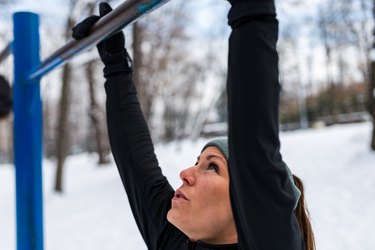
Chest pain following pull-up exercises can stem from several different causes, some serious and some that should respond to simple care at home. It may simply indicate a muscle pull or spasm.
However, it's not always simple to distinguish between less and more serious chest pain, which can indicate trouble with your heart. If you're in doubt about the source of the chest pain you get after pull-ups, you should contact your physician immediately.
Video of the Day
Video of the Day
Chest Pain from Pull-Ups
The chest pain you feel after doing pull-ups could be related to a muscle strain. If your chest muscle seems painful when you press in one particular spot, muscle strain likely has caused that pain.
To treat your muscle pain strain according to Mayo Clinic, lay off the pull-ups for a few days to allow your chest muscle to heal. In addition, you can treat the pain with ice or heat, along with an over-the-counter pain killer such as acetaminophen.
Read more: Armpit Pain During Pull-Ups
Costochondritis and Tietze Syndrome
Two different conditions, costochondritis and Tietze syndrome, can cause chest pain after pullups, according to Mayo Clinic. Costochondritis involves inflammation in the cartilage that connects your rib cage to your sternum. It causes a dull ache, along with sharp pains that can occur with sudden movements or even a minor shift in position.
Tietze syndrome involves swelling in the same area. This syndrome usually presents in people who are under the age of 40 according to the National Center for Advancing Translational Sciences.
You can treat these conditions yourself by slowing down your exercise routine for a few days to allow the inflammation to subside and apply heat or ice according to your doctor's instructions. Over-the-counter pain relievers can alleviate the discomfort.
Read more: Can You Do Pull-Ups Every Day?
Other Causes of Chest Pain
Other potential causes of chest pain include gastroesophageal reflux disease —GERD — esophageal spasms, exercise- induced bronchoconstriction, pinched nerves, gallbladder disease and even hyperventilation according to Cleveland Clinic.
Unless you've experienced the exact same pain before and know what it feels like, it can be difficult or impossible to distinguish between any of these conditions, including muscle strain and joint inflammation.
Heart Attack or Angina
Although it may be more likely that your chest pain following pull-ups represents an injury or a strain, it's also possible that you're having a heart attack or angina, a form of chest pain that indicates heart disease, according to Harvard Health.
In fact, it's not unusual for someone who hasn't exercised in a long time to experience the first twinges of angina — or even a heart attack — during strenuous exercise. Physicians use a series of medical tests to distinguish between the various types of chest pain and to determine if a person needs immediate medical care for a heart problem.
If you're not sure why you're having chest pain following pull-ups — or if you suspect heart disease might be causing your symptoms — seek immediate medical attention.